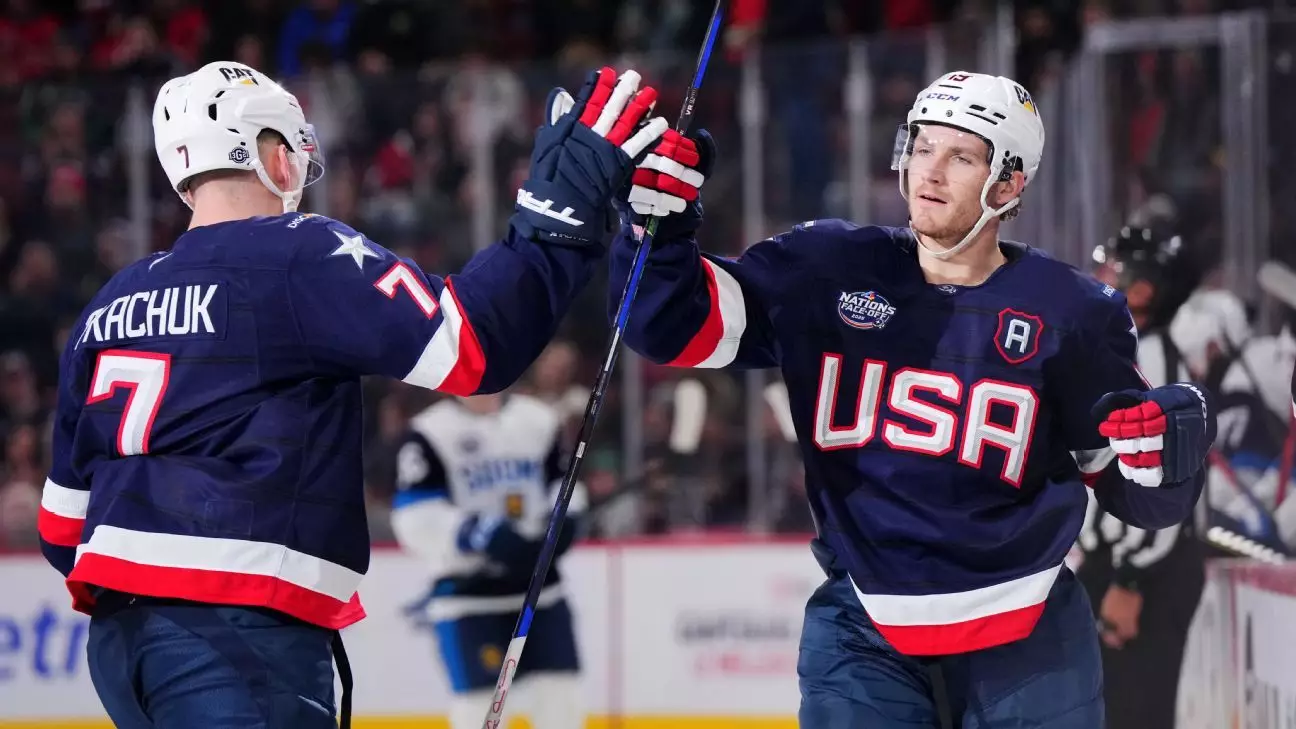The intersection of politics and sports often provides a fascinating backdrop to athletic events, and this was glaringly evident during the NHL 4 Nations Face-Off championship game between Canada and the United States. In a tournament saturated with competitive spirit, the emphasis increasingly shifted from the sport itself to the political narrative it unintentionally fostered. This rivalry served not just as an arena for athletic prowess, but also as a stage where national identities and political ideologies are scrutinized and expressed.
In the buildup to the championship game, both teams found themselves discussing a rather unexpected guest—President Donald Trump. The surreal experience of receiving a call from the leader of the free world prior to such a fierce competition took center stage in players’ minds. Team USA’s Vincent Trocheck described the encounter as “one of the cooler experiences” he’s been a part of, spotlighting how significantly such interactions can impact athletes. The presence of the president offers validation and recognition, but it also intertwines hockey with the political climate, whether athletes intend this connection or not.
Teammate J.T. Miller echoed similar sentiments. The players not only felt a sense of pride in the acknowledgment but also carried the weight of political implications. The excitement of having Trump speak to them was tempered by the awareness that such a moment is enmeshed in wider geopolitics. Given the graphic commentary regarding Canada potentially becoming the “51st state,” even light-hearted exchanges become tangled in a web of national pride and rivalry. The gesture from Trump was indeed monumental but laden with unintended consequences, shaping player perceptions and emotional responses around the event.
As the game neared, tensions heightened markedly. The air crackled with political undertones manifested in the cheers and jeers of the crowd during national anthems, a reflection of the strong sentiments on both sides. The political undercurrents became particularly palpable during previous encounters, such as when three fights erupted within the first nine seconds of their earlier match. Such incidents are a testament to how sports can amplify existing tensions, showcasing how competitive frameworks translate to broader nationalistic fervor.
Canada’s coach Jon Cooper encapsulated this notion succinctly when he addressed the cultural discourse surrounding the game. He pointed out that while discussions regarding political implications arise, the focus for players needs to remain on the sport itself. The statement highlights a divide between the athletes’ experiences and the larger societal context, separating their commitment to the game from the political theatrics that surround it. There is a fine line between taking pride in national representation and becoming embroiled in a contentious debate.
This hockey championship thus unfolded not just as a competition but as a microcosm of the deeper political landscape shared by these two nations. The intertwined narratives of national pride, identity, and political governance play out on the ice, shaping not just the players’ performances but also the public’s perception of the rivalry. While the primary goal exists as winning the game, the surrounding dialogue has captured national attention in ways hardly anticipated beforehand.
As the dust settles post-tournament, the implications linger. This event has undoubtedly strengthened the existing framework of hockey as a national sport while highlighting how deeply political conversations can seep into realms traditionally viewed as apolitical. The mishmash of enthusiasm for championship glory alongside political commentary creates a unique cultural phenomenon, one that enriches the conversation around the sport while complicating its more simplistic interpretations.
The NHL 4 Nations Face-Off has proven itself to be a platform where sportsmanship, national identity, and politics collide. As teams vie for glory, fans and players must navigate the broader implications of rivalry, awareness, and pride, ensuring that the game remains exhilarating while acknowledging the landscape that frames it. This duality leaves us reflecting on how each sports competition can ripple through society far beyond the final whistle, galvanizing conversations about identity and rivalry that can inform and provoke discourse long after the players depart the ice.

